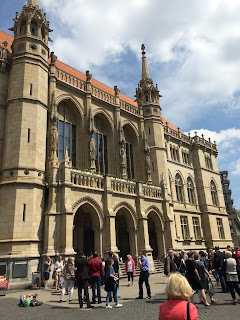So as mentioned in the previous post, my primary responsibilities at the Georg Eckert Institute have involved preparations for the annual Georg Arnhold International Summer School on Education for Sustainable Peace, which goes from June 21st to the 27th. Eighteen early career scholars and practitioners will join us in Braunschweig to present their research on a topic related to the theme of this year’s school, which is “Transitional Justice and Education: Engaging Children and Youth in Justice and Peacebuilding Through Educational Media, Curricula, and Outreach.” The projects highlight the key approaches and challenges of incorporating justice and peace into educational materials and curricula in communities recovering from a history of mass violence and oppression. Also joining us for the summer school are eight mid-career professionals, all of whom have extensive backgrounds working with transitional justice education, to provide feedback to the researchers and host workshops designed to assist the participants in their continued research. The summer school is co-sponsored by the International Center for Transitional Justice (ICTJ) in New York city, with one participant and two of the mid-career professionals joining us from the renowned organization. Since my boss advised me to wait until the school starts and ask participants for permission, and because I have only read their abstracts and lit. reviews so far, I am going to hold off until the conclusion of the program to write about specific presentations and the key themes of the week. But I did want to elaborate on the general themes of the summer school and what I have been doing in preparation.
The topic of the summer school itself was a major reason (amongst many of course) that I chose this position for my summer internship placement. My interest in transitional justice goes back to my studies of Holocaust and Genocide studies as an undergrad, as I attempted to comprehend how individuals and communities can effectively move beyond the legacy of mass violence and oppression in a peaceful and productive manner. Communities express a desire to move forward in the aftermath of mass violence, but struggle with how to most effectively administer justice and accountability, reconcile tensions among groups, and address the trauma of human rights abuses in a healthy approach. In the past two decades, education has been recognized as an important tool for governments and NGO’s to help engage communities critically address a violent history, while also encouraging peaceful and sustainable dispute resolution techniques.
How the legacy of violence is handled in a post-conflict society will have generational impacts, which is why government officials, policy makers, and educators are faced with the difficult task of addressing past events of violence in a way that encourages reconciliation and peacebuilding without furthering tensions between groups. Education can exacerbate conflict if not handled properly, as the group tensions and trauma left over from past violence makes dialogue on such subjects an extremely sensitive issue. As a result, approaching justice and peacebuilding in the classroom is an incredibly delicate process. On one end, the society needs to address the root causes and actors of past violence, in hope that through this comprehension future generations can move beyond a violent shared history and become a more peaceful and tolerant society. But on the other end, this process relies on victims being able to critically approach their traumatic past, which may be too contentious for people whose victimization is too fresh. Also, the now ruling political regime may demand a one-sided narrative of past abuses that clears their name of any wrongdoing, or places the blame on rival groups.
Visiting scholars and participants in the annual summer school focus their research on topics related to how transitional justice principles are being administered through educational materials and curricula in post-conflict regions, and how these approaches can be more effective moving forward. This is a vital step in any region dealing with a traumatic past, as how such events are addressed in school will play a major role in forming a child’s overall conception of the violent history of their homeland. This becomes even more difficult in cases where the children experienced human rights abuses, or lost family members to the violence. In other cases such as in the former Yugoslavia, many current students students are the offspring of victims and perpetrators during the Ethnic cleansing campaigns during the mid-1990’s, and proper education is crucial to assist children in trying to make sense of their particular home country's recent and violent past. In such cases, ethnic tensions may continue to thrive long after the end of violence, and education can help facilitate better reconciliation and cooperation among rival groups. Transitional justice is a vital component of sustainable peace, and I would argue that education can be the most effective platform for instilling the ideals of justice and peace into a community that may have for years been tragically devoid of either, and help them move towards a more tolerant and nonviolent future.
I am incredibly excited to finally meet the participants and hear them elaborate on their topics, and who knows, maybe provide some constructive feedback to thes early career scholars. I will likely be the only participant without a PhD (or masters for that matter) but I do believe the CR program has provided me with the knowledge and skills to critically engage each research project, and participate in a cordial platform for dissecting ideas and best approaches for peace education in post-conflict regions. I look forward to sharing what I have learned, and more about the researchers themselves in the coming week.





